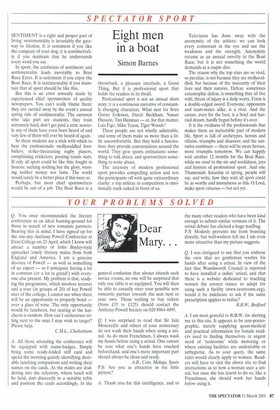Eight men in a boat
Simon Barnes
SENTIMENT is a right and proper part of living; sentimentality is invariably the gateway to illusion. It is sentiment if you like the company of your dog; it is sentimentality if you maintain that he understands every word you say.
In sport, the confusion of sentiment and sentimentality leads inevitably to Boat Race Error. It is sentiment if you enjoy the Boat Race. It is sentimentality if you maintain that all sport should be like this.
But this is an error annually made by experienced chief sportswriters of quality newspapers. You can't really blame them:• they are carried away by the event's annual spring tide of sentimentality. The oarsmen who take part are students, they train extremely hard, don't get paid a cent, scarcely any of them have even been heard of and very few of them will ever be heard of again.
So these students are a stick with which to beat the professionals: mollycoddled footballers, strike-threatening rugby players, complaining cricketers, pouting tennis stars. If only all sport could be like this: fought in honour, seeking nothing but the glory, wanting neither money nor fame. The world would surely be a better place if this were so.
Perhaps, but most chief sportswriters would be out of a job. The Boat Race is a throwback, a pleasant interlude, a Good Thing. But it is professional sport that holds the readers in its thrall.
Professional sport is not an annual short story: it is a continuous narrative of constantly changing characters. What next for Sven Goran Eriksson, David Beckham, Nasser Hussain, Tim Henman — or, for that matter, Luis Figo, Mike Tyson, Tiger Woods?
These people are not wholly admirable, and some of them make us more than a little uncomfortable. But they hold a fascination: they provide conversations around the world. They give sports enthusiasts something to talk about, and sportswriters something to write about.
The intensity of modern professional sport provides compelling action and sets the participants off with quite extraordinary clarity: a top athlete in competition is emotionally stark naked in front of us. Television has done away with the anonymity of the athlete: we can look every contestant in the eye and see the weakness and the strength. Anonymity returns as an annual novelty in the Boat Race, but it is not something the world demands as a staple diet.
The reason why the top stars are so vivid, so peculiar, is not because they are mollycoddled, but because of the insecurity of their lives and their natures. Defeat, sometimes catastrophic defeat, is something they all live with; threat of injury is a daily worry. Form is a double-edged sword. Everyone, opponents and team-mates alike, is a rival. And the career, even for the best, is a brief and hurried dream, hardly begun before it's over.
It is the vividness of the professionals that makes them an ineluctable part of modern life. Sport is full of archetypes, heroes and villains, triumphs and disasters; and the narrative continues — there will be more heroes, more triumphs tomorrow. We can happily wait another 12 months for the Boat Race, while we revel in the sin and sordidness, joys and horrors of professional sport. And one Thamesside Saturday in spring, people will say, and write, how they wish all sport could be as worthy and anonymous as this. 0 Lord, make sport virtuous — but not yet.


























































































 Previous page
Previous page